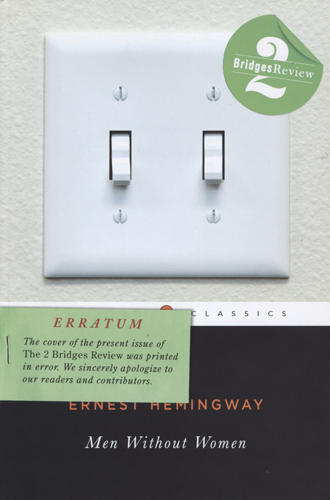2 Bridges Review – Spring 2016
In her extended interview with George Guida featured in this volume of 2 Bridges Review, poet Kim Addonizio references Macbeth’s speech about how life is a poor actor, strutting and fretting about the stage for his brief moment of fame before fading away to nothingness. With these words, Addonizio seems to have set the unifying theme of this volume; on its pages, beginning with the cover, readers find writers and artists exploring the ways in which people strut and fret.
In her extended interview with George Guida featured in this volume of 2 Bridges Review, poet Kim Addonizio references Macbeth’s speech about how life is a poor actor, strutting and fretting about the stage for his brief moment of fame before fading away to nothingness. With these words, Addonizio seems to have set the unifying theme of this volume; on its pages, beginning with the cover, readers find writers and artists exploring the ways in which people strut and fret.
The cover artist, Michael Kellner, has explained that his quiet work expresses in simplicity what cannot be contained in even the most extravagant detail. It does not strut, if you will, but it takes on the thing that struts. His cover piece for this journal seems a blatant remark upon the power of big names in literature to eclipse smaller, equally valuable, and perhaps more uniquely beautiful smaller presses and publications such as 2 Bridges Review, which is published in print and online by the New York City College of Technology at City University of New York.
My daughter has suggested that Kellner, who has illustrated each of the first five volumes of this journal, “sticks it to the man” in this cover, meaning he takes on the Penguin Classic and the kinds of monster figures in literature it features, including Ernest Hemingway. The simple light switch on the front can be interpreted in several ways, including associations with both bridge and switch in technological terms: that is, the relaying of a message via a particular path.
Showing off (strutting) is part of what writers do. I have a friend who sometimes questions whether his stories and poems are doing something true or are just showing off, but when people go to poetry readings, I think they are hoping for something more show off than straightforward. Regarding Addonizio, Guida notes the strength of her public readings, at which she is “a serious stage presence who delivers powerful renditions of her poems and sometimes accompanies them with a blues harmonica.” Poetry readings should be memorable in a world in which so much, as noted in William Logan’s poem “Memories of 1967,” is “if remembered, soon forgotten.” We strut to be remembered, and we fret about whether anyone remembers us. When we have lain with another human being in our temporary couplings, or when we have endlessly fantasized about doing so, as described in Barrett Warner’s “Dreamer,” repetition of these memories is a means of both holding on to these experiences and becoming free: “the more I take, the more I let go / a blind angel, flying, burning.”
Similarly, we fret about our possessions, as Phyllis Gobbell acknowledges in “What We Keep, What We Throw Away,” and about what others think of us, which Shane Collins relates in “Physical Training.” Our possessions themselves may carry a sense of our goodbyes and griefs. At the beginning of Stephanie Emanuele’s “Leaving New York,” even the Barbies appear to fret in their moving boxes, eventually leading us to where the speaker’s father pulls the car over and cries at the wheel. Another father worries that his son has autism because the boy regularly whispers to himself, while the mother is envious because she is unable to see what she wants or say what she wants to say in Robert Earle’s “The Whispering.”
A girl repeatedly attempts to tame her hair in Christine Stroud’s “My Last Evening in Ho Chi Minh City,” before, in a moment of tenderness, her brother helps her out. We fret about what we can control so that our greater worries remain at bay: a mother turns down the flame on the rice and goes out to bring laundry in before the rain in Rachna Kulshrestha’s “Spate,” and we join a “festival of raised arms inciting smiling bullets” in Tshaka Campbell’s “This is Not About Mike Brown,” the most impressive poem in the collection. The bullets, meanwhile, go on strutting, and in our imagination, like Liv Lansdale’s speaker in “After You Called,” we let our people strut.
This is the work of writers, “Of Poets in Winter” described by Robert Viscusi as never giving up. It is the work of artists, including Marcel Duchamp disguised as his female alter-ego Rrose Sélavy, mentioned on the back cover of the journal. In this edition, 2 Bridges represents our efforts to get to the bottom of our intense individual and shared experiences as well as our contradictions.
[www.2bridgesreview.blogspot.com]





